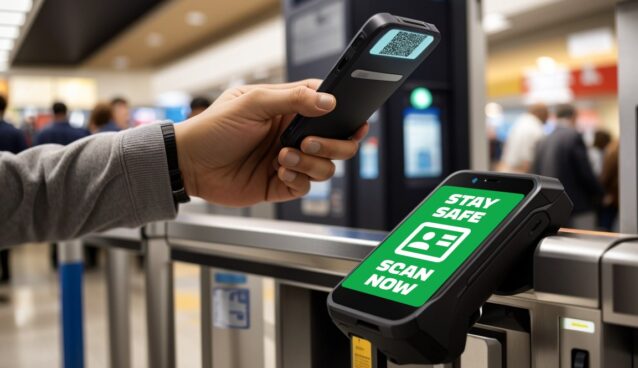From Tool to Tyranny: Why Mandatory Digital ID Is a Threat to Freedom

In the UK today, digital identity is being quietly prepared for mass deployment, not just as a tool of convenience, but as an infrastructure of control.
Two major proposals have recently emerged.
The “BritCard”, promoted by Labour-affiliated think tank Labour Together, is mooted as a smartphone-based digital ID, linked to the Gov-uk Wallet, intended to unify personal credentials for everything from health to benefits to job applications. Though officially only “under consideration,” it’s being positioned as a key tool for modernising government and tackling fraud.
However, a far more sweeping proposal is reportedly also in the pipeline. This secretive internal plan known as “Operation Kelp”, is said to be developed by the Tony Blair Institute and currently under consideration in Downing Street. We are to understand that this will be based on a “unique digital identifier” and backed by a centralised record tied to every citizen, linking various databases and access points. The public has not seen the full proposal. It was not in Labour’s 2024 manifesto. And it has not been subjected to democratic debate.
Despite their differences, both proposals point toward the same endpoint, a mandatory, centralised digital ID system that acts as a passport for access to society itself. The logic is that identity should be state-managed, digitally enforced, and mandatory for full participation in modern life. Sold to the public under the banner of “modernisation” or “immigration control,” these systems risk turning Britain into a permission-based society, where freedom is no longer presumed, it is licensed, and revocable.
From a liberty-minded perspective, these proposals are not about modernisation, but rather about redefining the relationship between the individual and the state. State-controlled digital ID is not a convenience after all, it is an instrument of control. By turning identity into an access token, access can be denied.
Once in place, it enables the state to control who can work; restrict who can access healthcare, education, or housing; freeze financial accounts; deny communication tools (phones, internet, apps) and exclude individuals from travel or even protest.
The result is a new kind of programmable citizenship, where rights become conditional, and non-compliance can result in digital exile.
You won’t need to be imprisoned, when you can just be locked out of society.
As I describe this, many will imagine it only impacting other people – those they think deserve to be locked out, or need to be controlled. From those aligned differently politically, to illegal immigrants, they can’t imagine it could possibly be a bad thing. They always think government will be competent, and be their friend. If this is you, think again.
Once digital ID becomes mandatory and linked to essential services, every UK citizen must constantly prove they have a right to exist within their own country. Miss an update or lose your phone? You’ll be locked out of services. Fall afoul of a future policy? You’ll be marked non-compliant. Question the state too forcefully? Get flagged and singled out for interview at checkpoints, or frozen out completely. It is not hard to imagine a future where dissenting voices are “throttled” by denying access to payment platforms, communications tools, or basic services.
If you’re worried about ‘two tier’ justice now, imagine what it could become under digital ID!
You see, the real danger is not just exclusion, it’s the totalisation of the system. Once digital identity becomes the gateway to everything, those who control the ID system control life itself.
This is not a paranoid fantasy, it is a logical consequence of linking all participation in society to a single, government-managed system of identification.
Of course, it won’t be sold that way, that would be terrible marketing. It will be about convenience, it will be about ‘staying safe’, or – and this could be popular – it will be about controlling immigration.
But even immigration control is a weak justification for a dangerous tool, and doesn’t stand up to scrutiny. In places where ID is already used, they continue to face large-scale illegal immigration, their black-market economies thrive and document fraud is rampant.
So the argument becomes “we need to make the ID more robust”, and digital IDs are touted to be exactly that.
But here’s the catch, it only ‘works’ if everyone is treated like a suspect. For a digital ID to stop illegal immigrants, it must be mandatory for every citizen; be enforced at all interaction points (jobs, renting, healthcare, travel); and be linked to real-time databases that validate your entitlement.
In other words, every British citizen must live under the same level of surveillance and verification as a suspected foreign national, for digital IDs to be effective barriers to illegal immigration.
You’d be forgiven for thinking there’s something Hegelian going down.
By failing to protect the national border, perhaps the wannabe world rulers will get us to beg for security some other way. If we accept this solution, the border won’t just be at Dover any more – it will be between you and your doctor, your landlord, your employer, and your bank – creating a permanent internal checkpoint society.
Digital IDs won’t just filter immigrants; they will control everyone. What could begin as an immigration measure evolves into a universal compliance system. You won’t be proving you’re not illegal – you’ll be proving you’re still approved.
It’s a fundamental shift from “presumed citizen” to “presumed unauthorised unless verified.”
And you can bet the same government that implements this to ‘solve immigration’ will grant amnesty to each one once the system is in place – after all, they’re being tracked (and so are you).
Even if a digital ID begins as a “voluntary” measure, history shows these systems follow a predictable trajectory described as the ratchet effect. Voluntary for convenience becomes, recommended for certain services, becomes universal for all services, becomes mandatory and required for basic existence.
At that point, it’s not just a tool. It’s a platform of power.
And once in place, it will not be rolled back, it will only grow, powered by mission creep, fear, and political opportunism.
Say no before it’s too late.
BritCard, Operation Kelp, whatever other options there may be, and their digital ID offspring are not neutral policies. They are a re-engineering of citizenship, a fundamental shift of power between the people and the state. They create a programmable society, where rights become permissions, and access is centrally controlled.
They do not solve illegal immigration.
Rather than protecting your privacy, they place more information about you than ever in the hands of the state.
If we accept this now, we are handing all future governments – regardless of their ideology – the ability to micromanage our lives, throttle dissent, and decide who may participate in society, and who may not. In the name of order we get the architecture of digital tyranny.
The time to say no is before it’s implemented – not after it’s normalised.
That will be too late.
